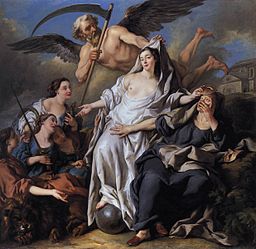I guess most readers will immediately recognize the first part of the title of this post. In Annajanska, The Bolshevik Empress, the Grand Duchess admits how decayed and disintegrated her reigning house is, a fact that Strammfest cannot wrap his head around:
THE GRAND
DUCHESS. Do not deceive yourself, General: never again will a Panjandrum reign
in Beotia. [She walks slowly across the room, brooding bitterly, and thinking
aloud.] We are so decayed, so out of date, so feeble, so wicked in our own
despite, that we have come at last to will our own destruction.
STRAMMFEST.
You are uttering blasphemy.
THE GRAND
DUCHESS. All great truths begin as blasphemies. All the king's horses and all
the king's men cannot set up my father's throne again. If they could, you would
have done it, would you not?
Before we move on, has anyone ever tried looking up the two German words that plausibly make up Strammfest's name?

At any rate, if it is easy to see how Shaw would probably agree that great truths begin with an upturn of the statu quo, the paradox remains all the more striking when we read the following lines, from the preface to The Adventures of the Black Girl in her Search for God:
"I hold as firmly as Thomas Aquinas that all truths ancient or modern are
divinely inspired; but I know by observation and introspection that the
instrument on which the inspiring force plays may be a very faulty one."
In other words, truths may strike many people on the head, but not so many will recognize them when they're struck. It is also to be noted that Shaw admitted to having experienced the incapability to ascertain the truth "by introspection" amidst his many inspired thoughts. A rare example of modesty.
At the same time, the leap from blasphemy to divine inspiration is rather shocking. Given that Annajaska was written more than 10 years before The Black Girl, this evolution in Shaw's philosophical outlook is quite striking - if, of course, you believe that there is a piece of Shaw in the words of his characters.
Perhaps we can bridge the gap between divine revelation and blasphemy if we understand, as we read in the preface to Back to Methuselah, that
"Freethinkers read the Bible: indeed they seem to be its only readers now except the reluctant parsons at the church lecterns, who communicate their discomfort to the congregation by gargling the words in their throats in an unnatural manner that is as repulsive as it is unintelligible. And this is because the imposition of the legends as literal truths at once changes them from parables into falsehoods [...] All the sweetness of religion is conveyed to the world by the hands of storytellers and image-makers. Without their fictions the truths of religion would for the multitude be neither intelligible nor even apprehensible; and the prophets would prophesy and the teachers teach in vain. And nothing stands between the people and the fictions except the silly falsehood that the fictions are literal truths, and that there is nothing in religion but fiction."
In other words, divine inspiration must be filtered by an intelligent - however unreasonable - mind if you want to create something good out of it.
If we return to Shaw's seemingly contradictory - paradoxical, to say the least - views on how truth is to be known, it is also important to point out that Shaw tried to separate philosophical truth from practical truth. This is perhaps one of the keys to understanding the paradox. In the question of practical truth, as we read in the preface to On the Rocks,
"It
was very generally believed as lately as in Victorian times that religious
education consisted in imparting to children certain eternal, final, and
absolute truths. I, for instance, being the son of an Irish Protestant
gentleman, found myself, at the dawn of my infant conscience, absolutely
convinced that all Roman Catholics go to hell when they die, a conviction which
involved not only a belief in the existence of hell but a whole series of
implications as to the nature and character of God. […] No future education
authority, unless it is as badly educated as our present ones, will imagine
that it has any final and eternal truths to inculcate: it can only select the
most useful working hypotheses and inculcate them very much as it inculcates
standard behaviour throughout that vast field of civilized conduct in which it
does not matter in the least how people act in particular situations provided
they all act in the same way, as in the rule of the road. All the provisional hypotheses may be
illusions; but if they conduce to beneficial conduct they must be inculcated
and acted on by Governments until better ones arrive."
Even if it is hard for us to reconcile Shaw's philosophy and his practical ideas - both regarding the truth and in more general terms - I think we cannot forget that, in the words of Tarleton (Misalliance):
TARLETON. [following him and sitting down on his
left] Paradox, paradox. Good.
Paradoxes are the only truths.





